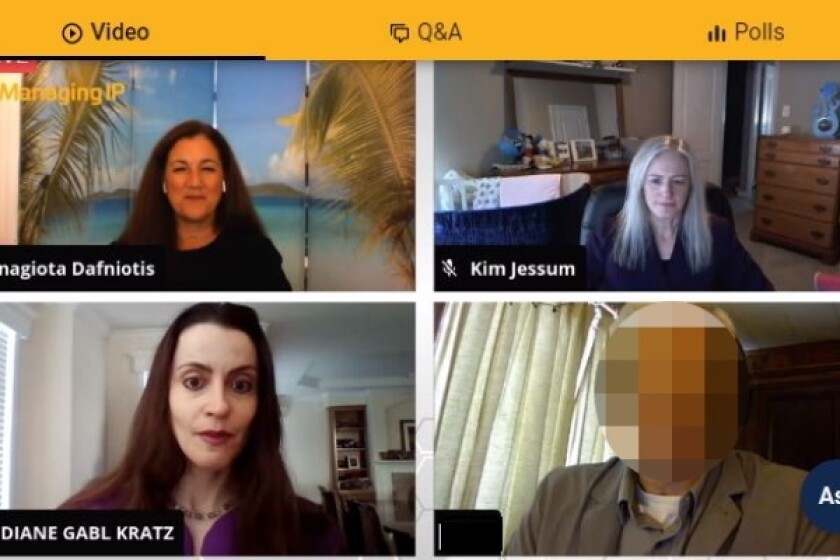Speakers at Managing IP’s US Patent Forum yesterday revealed their best trade secret tips in a virtual panel titled “Protecting and enforcing your trade secrets with a holistic approach”.
Speakers included a former counsel from data storage company Seagate Technology, an FBI agent and a lawyer from Heraeus, a technology group focused on precious metals.
Diane Gabl Kratz, a former senior IP counsel at Seagate Technology, said companies need to keep best training practices in mind when they educate employees on trade secret requirements.
She said she prefers to conduct live trainings because they give the legal department the ability to form relationships, and employees pay more attention to them. But she noted that in-person events are not an option during the pandemic.
She added that if companies must conduct online trainings, they should make sure there is a “non-trivial” quiz at the end of the sessions to ensure comprehension. The quiz should contain questions employees actually have to think about, she said.
“Many of us may be guilty of doing some mandatory training and having work on one screen and mandatory training on another, and not really paying attention. And then the quiz is written for first graders and you can pass it without paying attention. Those are not best practices,” she said.
Speakers added that companies should use exit interviews as an opportunity to enforce trade secret concerns.
Stealing and security
The FBI agent, who preferred to remain anonymous, said employers should remind workers of confidentiality rules during exit interviews. If employees go on to steal data after being reminded of the guidelines, companies will be more easily able to show that the departing employees had an intent to deceive.
He added that proper record keeping can help companies establish evidence of trade secret theft. Employers should have logs of employee activity that go back at least a year to show what a worker has accessed and what USBs he or she has plugged in.
He added that businesses should not only train workers when they first join the company but should also give them periodic reminders to make sure they understand trade secret restrictions. These ongoing trainings will also help companies establish that workers had an intent to deceive if they steal trade secrets, he said.
Kratz added that businesses should not overlook physical security. She says she knew a big international law firm that used shredding boxes to dispose of confidential documents. But the firm didn’t empty the boxes frequently enough, so they were often full when attorneys needed to get rid of papers. Many attorneys decided to just put the papers in the recycling instead.
“If that can happen at a large corporate international law firm, imagine what can happen at a small start-up,” she said.
Company buy-in
Kim Jessum, chief IP counsel at Heraeus in Philadelphia, said one of the most important considerations for lawyers who want to protect trade secrets is how to convince others at their companies to invest in the process.
Jessum said lawyers should get the CEO and other key executives such as the head of marketing, head of R&D and head of finance in a room (during non-COVID times) and identify key trade secrets.
“If you involve all those key players, you get more buy-in and can sell it to the overall company.”
The FBI agent agreed that executives need to pay attention to trade secret protection.
“It all starts at the top. If they’re not taking it seriously, employees aren’t taking it seriously.”
Best practices
Panellists also highlighted the importance of proving to courts that companies have taken the necessary steps to keep certain information proprietary.
Kratz said companies cannot claim that a practice is an industry custom to get around these requirements. For example, she said some companies have argued that no one in their sector bothers to lock certain information up, but that everyone recognises it as a trade secret.
But this argument doesn’t work and courts still expect companies to make reasonable efforts to protect trade secrets, she said.
She added that companies should distinguish between trade secrets and all their other information. If companies don’t differentiate, courts won’t consider their protection measures to be reasonable. And businesses can’t simply mark every document as highly confidential, she said.
Panagiota Dafniotis, partner at Dentons in Montréal, moderated the panel. Managing IP will publish more coverage from the US Patent Forum later this week.











